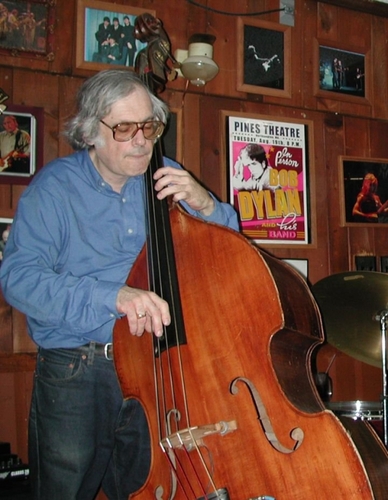DUMMERSTON — Creativity is not a tourist site.
We live in a place that prides itself on being an “art town.” We sell that image to newspapers and magazines in the hope that it will drive the tourist trade our way. And it seems to be working.
But being an art town can't just be a shallow marketing ploy.
There are consequences. It means that we are lucky to live among highly intelligent, sensitive, eccentric people who are marching to the beats of many different drums. We live surrounded by the beautiful, the surreal, and the unexpected.
Vermont has always nurtured artists and eccentrics. “A civilized society is one which tolerates eccentricity to the point of doubtful sanity,” said Robert Frost.
A few weeks ago, I found myself trying to puzzle out the combination of creativity, intelligence, and eccentricity that goes into making art.
It was something to think about at a difficult event - the memorial service for Dave Shapiro, a brilliant mathematician, teacher, and swinging bebop jazz bassist with an encyclopedic knowledge of American music.
The memorial was held, appropriately enough, on the stage of the Vermont Jazz Center. Many musicians, including Dave's sister, New York cabaret singer Susan Barth, spoke and performed.
Susan told us that Dave, as a kid, had been tested as having an IQ of 180 by the New York City school system.
“It didn't make for the easiest person,” she told me later.
As a product of that school system myself, I can attest that marching to a different drummer is deeply frowned upon there, which means that I understand what Goethe meant when he said, “People of uncommon abilities generally fall into eccentricities when their sphere of life is not adequate to their abilities.”
No one ever really gets inside another person's head, but Dave may have been one those people.
* * *
Watching the musicians playing in Dave's honor, I wondered at how such an eclectic, obsessed, and talented group of people can survive, much less make a living, out of jazz in such a small place as Windham County.
Pianist Eugene Uman, who does it partially by running the Vermont Jazz Center, eulogized Dave as a “jazz warrior.” That term probably covered most of the performers, as well as the audience.
Dave died in his own home, of hypothermia, at the age of 58. It's a shocking death. He left behind a wide group of saddened and bewildered family, friends, and colleagues.
I met Dave and his wife, the late painter Jocelyn Brodie, many, many years ago. I was lucky enough to meet many interesting people through them and to hear a lot of great jazz.
Jocelyn died in December of 2009. Dave lasted exactly one year without her. During that year, Dave turned introspective in a frightening way. He alienated most of the people he knew - which may have been the reason he died the way he did.
“It's difficult to help someone who wants to be left alone,” Uman said.
Townshend musician Ned Phoenix, who performed at the memorial, was close to Jocelyn and Dave.
“The only person Dave could relate to and communicate with perfectly was Jocelyn,” Ned said. “They grew up in Brooklyn and went to the same high school 27 years apart. Her passing was a blow to him in many ways.
“More reasons Dave and Jocelyn were such a match is that she was also brilliant, articulate, and encyclopedic, and they knew everyone in their fields.”
Ned, by the way, is not afraid of being eccentric.
“An eccentric is the part that sticks out (see mechanics definition),” he wrote in an email exchange after the memorial. “Therefore, the eccentric gets all the hard knocks. And the eccentric does the work. Yes, by self-definition and the proclamations of others, I am eccentric.”
* * *
For the most part, artists practice their art alone. “The painter must be solitary,” said Leonardo da Vinci. “For if you are alone, you are completely yourself, but if you are accompanied by a single companion, you are only half yourself.”
If one is completely one's own self, completely alone, plus highly intelligent and creative, the mind can easily create its own world. And it's not easy to live in any world, much less in one you create with your own imagination.
Eccentricity is not skin deep. There is a dark side to creativity.
Most of us whistle past the graveyard, but artists take it upon themselves to confront the deep fears that lie underneath our daily lives. They work with life's terrors, as well as its beauty and joy.
“I have long wondered, where does music come from?” Ned wrote. “I do not know other than it exists already in the future, as inevitable as death. When it's time, we encounter the experience, like passing through a doorway with bead strings. It passes over/through/around us. We can choose to experience it or not.
“The more we choose to experience,” he wrote, “the more doorways appear. Mozart. Beethoven. Duke Ellington has mansions full of doorways. Experience the big picture. It's all available. It's all now.”
